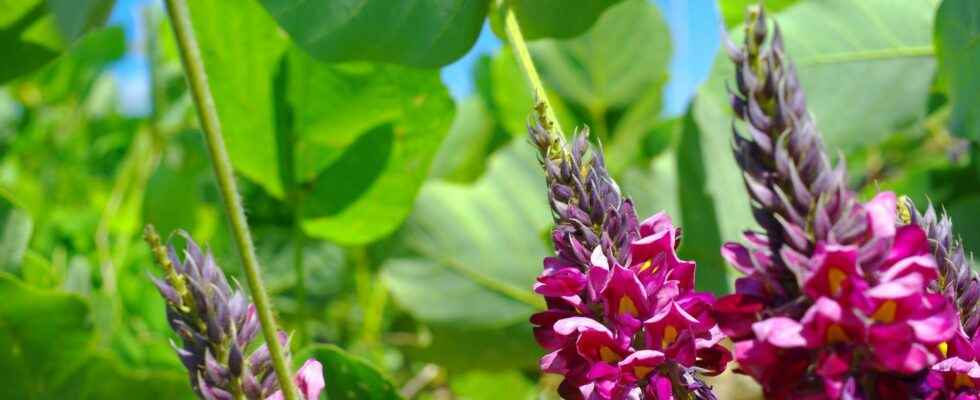Discover kudzu (Pueraria montana) or “Japanese vine” whose active ingredients act on the nervous system and reduce addiction.
You will also be interested
Kudzu (Pueraria montana) is a climbing, invasive plant similar in appearance to Virginia creeper. Originally from Asia, kudzu belongs to the Fabaceae family. Today, its root is of particular interest to researchers and scientists. And for good reason: it contains active substances which would act on neurotransmitters and would allow the cessation of various addictions.
History and origin of kudzu
Due to its creeping habit, kudzu is also known as “Japanese vine”. Its name comes from the Japanese “kuzu” which means “vine”. Originally from Asia, kudzu grows mainly in India, China and Japan, edge forests, on the sides of the road… It is an invasive plant that adapts to all types of soil.
The stems of the kudzu allow the plant to cling and climb on its support. Thus, kudzu can reach up to 30 m in height! In late summer, it produces abundant purple flowers whose nectar attracts many pollinators. But the most amazing part of kudzu remains its root, which can reach 2 meters in length, 20 cm in diameter and 180 kg.
In China and Japan, starch is extracted from the root to make a thickening starch that will be used in cooking. But the root of kudzu is also used as a medicinal remedy because of its many properties. In the traditional medicine Chinese, kudzu is particularly recommended to relieve diarrhea and vomiting.
Research in recent years has also made it possible to discover another property of kudzu: that of promoting the cessation of addiction (alcohol, tobacco, coffee, etc.). This is one of the main reasons for its use today as a dietary supplement.
Properties and benefits of kudzu
It is in the root that the main active substances of kudzu are concentrated. It contains in particular isoflavones (daidzein, pueranine and genistein), melatoninof the minerals (calcium, phosphorus) and estrogen. So many assets that would have beneficial effects against addictions.
Kudzu acts mainly on the nervous system and neurotransmitters including serotonin, GABA (acid γ-aminobutyric acid) and glutamate (glutamic acid). The flavonoids kudzu wield powerful power antioxidantare anti-inflammatories, anti-microbial and protect the heart. But the anti-addictive properties of kudzu come from puerarine.
In the brainit would act in particular on opioids and on the release of serotonin or “ hormone happiness “. Thanks to this, kudzu exerts a calming and soothing action on the central nervous system. The dependent person feels the lack less and even reduces his consumption.
It’s in the fight against alcoholism that kudzu proved to be particularly interesting. In a 2012 study, taking kudzu led to a decrease in alcohol consumption in humans.
But kudzu is not just an anti-addiction plant. Thus, it has other virtues:
- Relieves digestive disorders
- Reduces inflammation
- Relieves the headache and migraines
- Reduces the risk of cardiovascular disease
- Regulates blood sugar
Further studies are currently underway to learn more about this amazing plant. At present, only its action on alcoholism has been scientifically proven.
Contraindications and side effects of kudzu
The consumption of kudzu is not recommended for young children, pregnant and breastfeeding women and in case of family history of breast cancer. To avoid interactions with certain medications, it is advisable to seek the advice of a doctor before consuming kudzu.
Kudzu is safe at recommended doses.
Interested in what you just read?
Subscribe to the newsletter Health question of the week : our answer to a question you ask yourself (more or less secretly). All our newsletters
